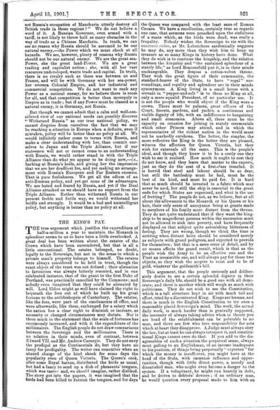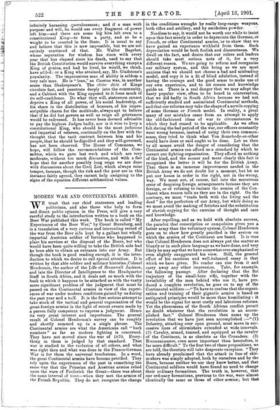THE KING'S PAY. T HE true argument which justifies the expenditure
of half-a-million a year to maintain the Monarch in splendour seems to us to have been a little overlooked. A .great deal has been written about the estates of. the Crown which have been surrendered, but that is all a little conventional. The estates belonged, no doubt, legally to the Sovereign, but not in the sense in which a private man's property belongs to himself. The estates were always considered to be held in trust, though the exact object of the trust was not defined ; their alienation to favourites was always bitterly resented, and in one celebrated instance, that of the grant to the first Duke of Portland, was practically cancelled by the Commons; and nobody even imagined that they could be alienated by will. Lord Eldon might as well have claimed the right to bequeath the fees out of which he built up his great fortune to the .archbishopric of Canterbury. The estates, like the fees, were part of the emoluments of office, and were afterwards, like them exchanged for a salary which the nation has a clear right to diminish or increase, as necessity or changed circumstances may dictate. Nor is there much in the statement that the scale of fortunes has enormously increased, and with it the expenditure of the .millionaires. The English people do not draw comparisons between the Sovereign and the millionaires. There is no relation in their minds, even of contrast, between Edward VII. and Mr. Andrew Carnegie. They do not envy the prodigal as the Continentals do, but they have no fancy for prodigality. The writer can remember when an absurd charge of the kind shook for some days the popularity even of Queen Victoria. The Queen's cook. after some Royal battue, distributed the birds as usual, but had a fancy to send up a dish of pheasants' tongues, which was taste,1 and, we should imagine, rather disliked. The story got filth the papers, it was imagined that the birds had been killed to furnish the tongues, and for days the Queen was compared with the least sane of Roman Cresars. We have a recollection, certainly true as regards one case, that sermons were preached upon the sinfulness of a waste which, as the birds were dead, was really a frugality. Nobody wishes the Sovereign to vie with the nouveaux riches,.as Mr. Labouchere sardonically suggests he may do,. any more than they wish him to heap up treasure as so many Kings in history have done. What they do wish is to continue the kingship, and the relation between the kingship and 'the sustained splendour of a stately life," as Lord Beaconsfield put it, is in their minds unchangeable. They despise a cotton-velvet throne. They wish the great figure of their community, the standard-bearer of the State, to have "regal" - sur- roundings, and regality and splendour are in their minds synonymous. A King living in a small house with a servant in " pepper-and-salt " is to them no King at all, only a mere squalid President, of no particular use. It is not the people who would object, if the King wore a crown. - There must be palaces, great officers of the Court, forests, gardens, and yachts, a continuous and visible dignity of life, with an indifference to bargaining and small economies. Above all, there must be the capacity on occasion for joining in stately ceremonials which other Princes may attend, and in which the representative of the richest nation in the w.orld must not be markedly outshone. The better, the simpler, the more reflective the King is the better they are pleased, witness the affection for Queen Victoria, but they wish for externals all the same. : This is the people's ideal, and though they know it to be a costly one they wish to see it realised. How much it-ought to coat they do not know, and they leave that matter to the experts, just as they do the - cost of a first-class ironclad. It is horrid that steel and labour should be_ so dear, but still the battleship must be had, must be the best of its kind, and must be paid for. It is hard that so much should be invested in a fabric which may never be used, but -still .the ship is essential to the great ends for Which States are organised, and what is the use of fretting ? The people do not, as we believe, fret at. all about the allowances to the Monarch or his Queen or his heir, their only sense of annoyance being at grants made to members of his family more distant from the throne. They do not quite understand that if they want the king- ship to be magnificent persons within the succession must not be allowed to sink into poverty, and have frequently displayed on that subject quite astonishing bitterness Of feeling. They are wrong, though we think the time is arriving when distant heirs should be considered merely as subjects with grand pedigrees, and expected to provide for themselves ; but that is a mere error of detail, and by no means affects the grand result, which is that as the people wish the Army to be an effective one and the Fleet an irresistible one, and will always pay for those two objects so they wish the sceptre to exist and to be of gold, Whatever the goldsmith's bill.
This argument, that the people seriously and deliber- ately desire to see a certain splendid dignity in their Sovereign's daily life, should be a good one with all demo- crats; and there is another which will weigh as much with politicians. They do not wish to see the Constitution, which is a tall structure kept in air with much toil and effort, tried by a discontented King. Kings are human, and there is much in the English. Constitution to try even a reasonably placid Sovereign's mind. The work, the actual daily work, is much harder than is generally supposed, the necessity of always taking advice when in theory you are head of the establishment can be palatable to no man, and there are few who love responsibility for acts which at heart they disapprove. A Judge must always obey the law, but at least he can always interpret it, and constitu- tional Kings cannot even do that. If you add to the dis- agreeables of such a situation the perpetual sense, always most galling to an Englishman, of an income inadequate to his position, of things being perpetually" expected "for which the money is insufficient, you might have at the head of the State, with immense influence and oppor- tunities, though with little direct power, a moody and dissatisfied man, who might even become a danger to the system. If a voluptuary, he might ran heavily in debt, and be driven to debtors' devices ; if an ordinary man, he would question every proposal made to him with an infinitely harassing verulousness ; and if a man with purpose and will, be would use every fragment of power left him—and there are some big bits left even to a constitutional King—to form a party, and so be a weight to be counted in the State. It is usual to say and believe that this is now impossible, but we are not entirely • convinced of that. Mr. Walter Bagehot, whose reputation for wisdom has risen with every year that has elapsed since his death, used to say that the British Constitution would survive everything except a King of genius, and had he lived, he would, we think, have ae.led : or a King who attained, say, Mr. Gladstone's popularity. The impecunious man of ability is seldom a very safe man. He is "lean," as Cassius was, in another sense than Shakespeare's. The obiter dicta of Kings circulate fast, and penetrate deeply into the community, and a Cabinet with the King opposed to it loses much of its self-confidence. Do what they will, statesmen cannot deprive a King of all power, of his social leadership, of his share in the distribution of honours, of his impre- scriptible charm for the multitude, always apt to believe that if he did but govern as well as reign all grievances would he redressed. It has never been deemed advisable to pay the highest Judges badly, nor is it wise to keep a constitutional King, who should be the most judicious and impartial of referees, continually on the fret with the thought that the tacit contract between him and his people, that he should be dignified and they self-governed, has not been observed. The House of Commons, we hope, will follow the recommendations of the Com- mittee, which we gave last week and which are very moderate, without too much discussion, and with a fair hope that for another possibly long reign we are done with discussions about the Civil List, which always raise temper, because, though the rich and the poor are in this instance fairly agreed, they cannot help assigning to the signs of the equation different arithmetical values.







































 Previous page
Previous page